Evaluation of Safeguarding Effectiveness for Dementia in Brentwood
VerifiedAdded on 2022/08/14
|28
|6766
|20
Report
AI Summary
This report evaluates the effectiveness of safeguarding vulnerable adults with dementia in the Brentwood borough. It begins with an introduction to dementia, its prevalence in the UK, and the vulnerability of those affected. The report establishes the background and rationale for the study, highlighting the increasing number of dementia cases in Brentwood and related incidents. It outlines the aim to assess the effectiveness of current safeguarding measures, along with specific objectives such as identifying the purpose of safeguarding, analyzing available services, evaluating concerns, and making recommendations. Research questions are presented to guide the investigation. The literature review covers issues faced by adults with dementia, including physical and mental abuse, and explores safeguarding activities performed by healthcare service users. The methodology includes a theoretical perspective, research and data collection methods, sampling techniques, and data analysis plans. The report concludes with limitations, a proposed time frame, and ethical considerations.
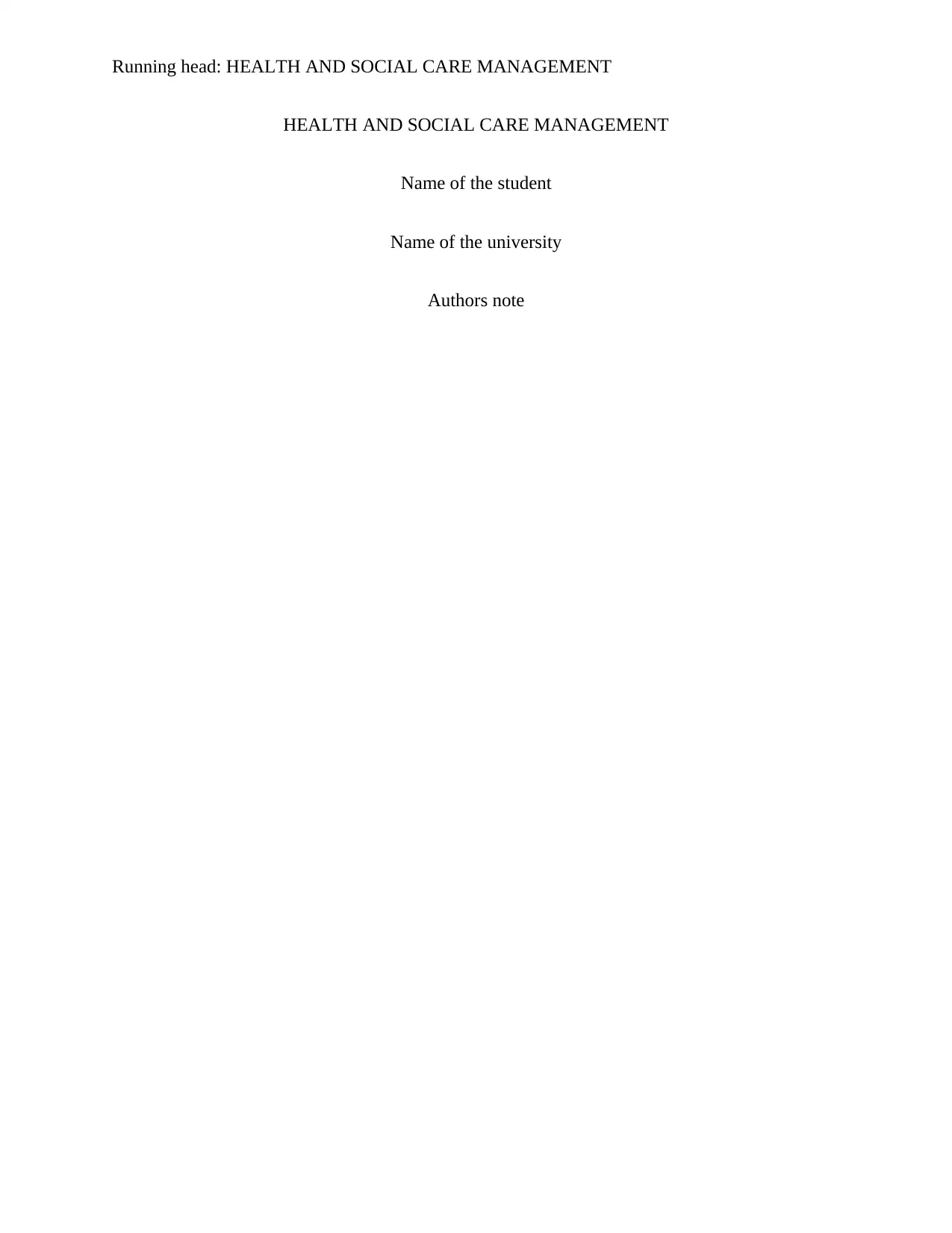
Running head: HEALTH AND SOCIAL CARE MANAGEMENT
HEALTH AND SOCIAL CARE MANAGEMENT
Name of the student
Name of the university
Authors note
HEALTH AND SOCIAL CARE MANAGEMENT
Name of the student
Name of the university
Authors note
Paraphrase This Document
Need a fresh take? Get an instant paraphrase of this document with our AI Paraphraser
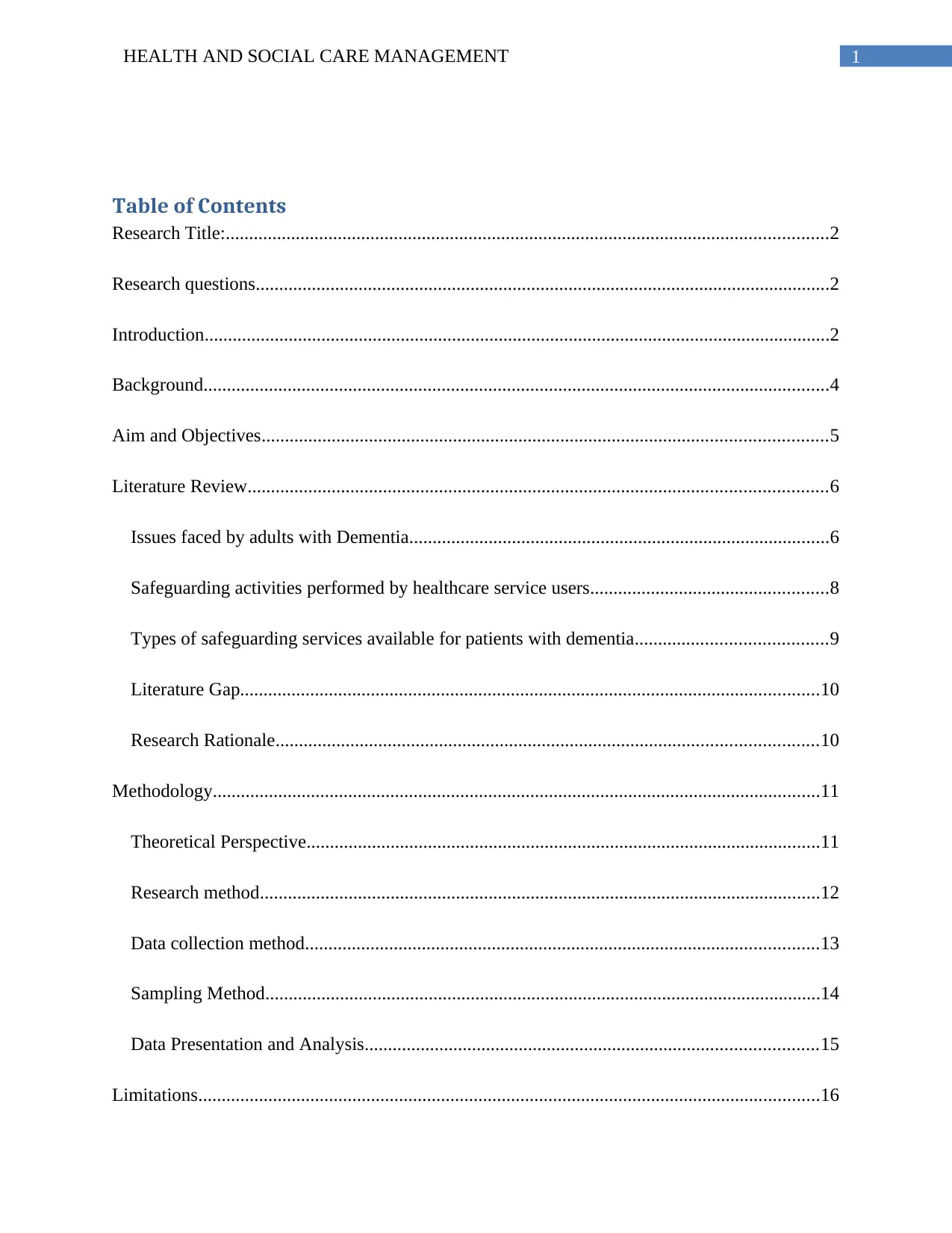
1HEALTH AND SOCIAL CARE MANAGEMENT
Table of Contents
Research Title:.................................................................................................................................2
Research questions...........................................................................................................................2
Introduction......................................................................................................................................2
Background......................................................................................................................................4
Aim and Objectives.........................................................................................................................5
Literature Review............................................................................................................................6
Issues faced by adults with Dementia..........................................................................................6
Safeguarding activities performed by healthcare service users...................................................8
Types of safeguarding services available for patients with dementia.........................................9
Literature Gap............................................................................................................................10
Research Rationale....................................................................................................................10
Methodology..................................................................................................................................11
Theoretical Perspective..............................................................................................................11
Research method........................................................................................................................12
Data collection method..............................................................................................................13
Sampling Method.......................................................................................................................14
Data Presentation and Analysis.................................................................................................15
Limitations.....................................................................................................................................16
Table of Contents
Research Title:.................................................................................................................................2
Research questions...........................................................................................................................2
Introduction......................................................................................................................................2
Background......................................................................................................................................4
Aim and Objectives.........................................................................................................................5
Literature Review............................................................................................................................6
Issues faced by adults with Dementia..........................................................................................6
Safeguarding activities performed by healthcare service users...................................................8
Types of safeguarding services available for patients with dementia.........................................9
Literature Gap............................................................................................................................10
Research Rationale....................................................................................................................10
Methodology..................................................................................................................................11
Theoretical Perspective..............................................................................................................11
Research method........................................................................................................................12
Data collection method..............................................................................................................13
Sampling Method.......................................................................................................................14
Data Presentation and Analysis.................................................................................................15
Limitations.....................................................................................................................................16

2HEALTH AND SOCIAL CARE MANAGEMENT
Time Frame....................................................................................................................................17
Ethical consideration.....................................................................................................................17
Reference list.................................................................................................................................18
Time Frame....................................................................................................................................17
Ethical consideration.....................................................................................................................17
Reference list.................................................................................................................................18
⊘ This is a preview!⊘
Do you want full access?
Subscribe today to unlock all pages.

Trusted by 1+ million students worldwide
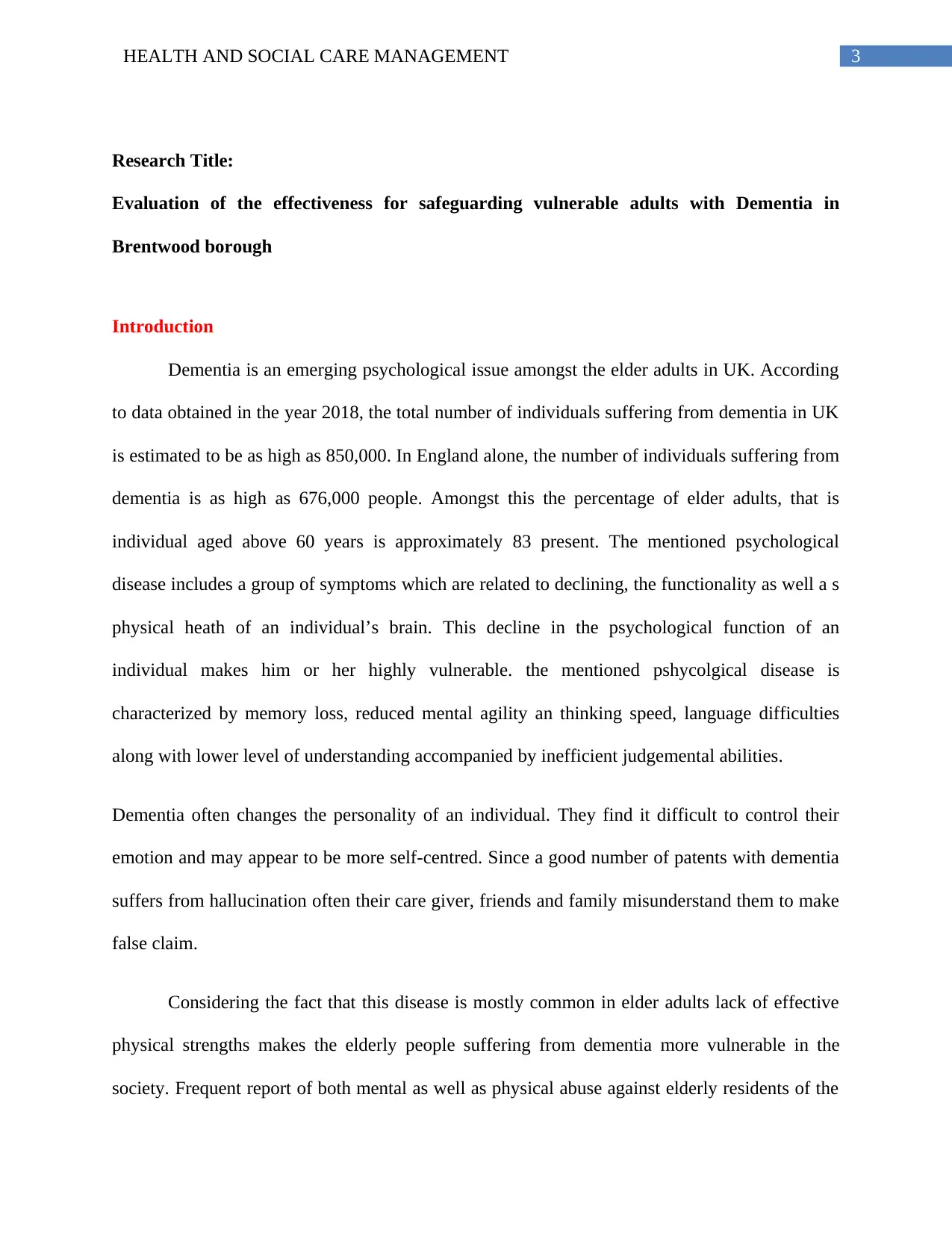
3HEALTH AND SOCIAL CARE MANAGEMENT
Research Title:
Evaluation of the effectiveness for safeguarding vulnerable adults with Dementia in
Brentwood borough
Introduction
Dementia is an emerging psychological issue amongst the elder adults in UK. According
to data obtained in the year 2018, the total number of individuals suffering from dementia in UK
is estimated to be as high as 850,000. In England alone, the number of individuals suffering from
dementia is as high as 676,000 people. Amongst this the percentage of elder adults, that is
individual aged above 60 years is approximately 83 present. The mentioned psychological
disease includes a group of symptoms which are related to declining, the functionality as well a s
physical heath of an individual’s brain. This decline in the psychological function of an
individual makes him or her highly vulnerable. the mentioned pshycolgical disease is
characterized by memory loss, reduced mental agility an thinking speed, language difficulties
along with lower level of understanding accompanied by inefficient judgemental abilities.
Dementia often changes the personality of an individual. They find it difficult to control their
emotion and may appear to be more self-centred. Since a good number of patents with dementia
suffers from hallucination often their care giver, friends and family misunderstand them to make
false claim.
Considering the fact that this disease is mostly common in elder adults lack of effective
physical strengths makes the elderly people suffering from dementia more vulnerable in the
society. Frequent report of both mental as well as physical abuse against elderly residents of the
Research Title:
Evaluation of the effectiveness for safeguarding vulnerable adults with Dementia in
Brentwood borough
Introduction
Dementia is an emerging psychological issue amongst the elder adults in UK. According
to data obtained in the year 2018, the total number of individuals suffering from dementia in UK
is estimated to be as high as 850,000. In England alone, the number of individuals suffering from
dementia is as high as 676,000 people. Amongst this the percentage of elder adults, that is
individual aged above 60 years is approximately 83 present. The mentioned psychological
disease includes a group of symptoms which are related to declining, the functionality as well a s
physical heath of an individual’s brain. This decline in the psychological function of an
individual makes him or her highly vulnerable. the mentioned pshycolgical disease is
characterized by memory loss, reduced mental agility an thinking speed, language difficulties
along with lower level of understanding accompanied by inefficient judgemental abilities.
Dementia often changes the personality of an individual. They find it difficult to control their
emotion and may appear to be more self-centred. Since a good number of patents with dementia
suffers from hallucination often their care giver, friends and family misunderstand them to make
false claim.
Considering the fact that this disease is mostly common in elder adults lack of effective
physical strengths makes the elderly people suffering from dementia more vulnerable in the
society. Frequent report of both mental as well as physical abuse against elderly residents of the
Paraphrase This Document
Need a fresh take? Get an instant paraphrase of this document with our AI Paraphraser
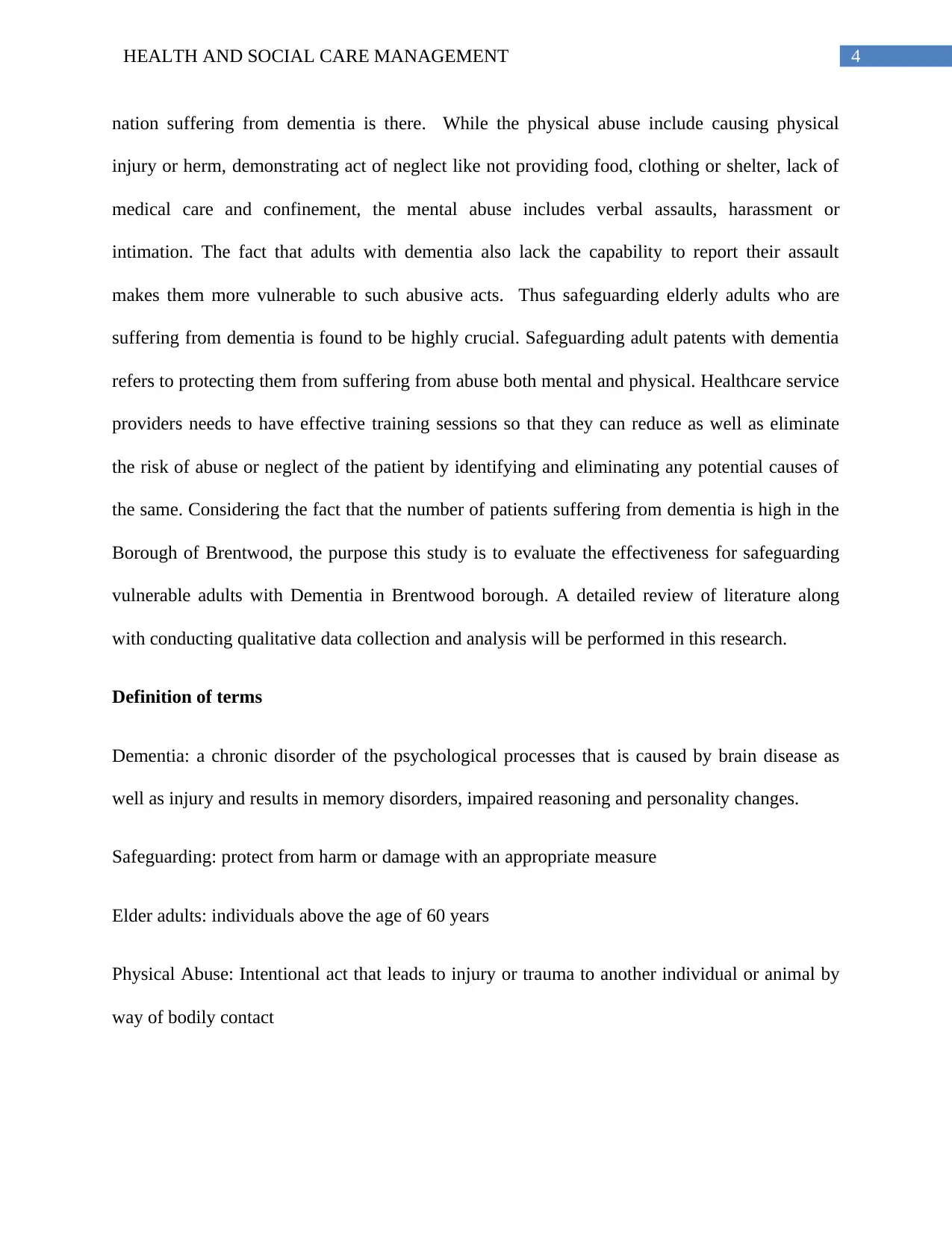
4HEALTH AND SOCIAL CARE MANAGEMENT
nation suffering from dementia is there. While the physical abuse include causing physical
injury or herm, demonstrating act of neglect like not providing food, clothing or shelter, lack of
medical care and confinement, the mental abuse includes verbal assaults, harassment or
intimation. The fact that adults with dementia also lack the capability to report their assault
makes them more vulnerable to such abusive acts. Thus safeguarding elderly adults who are
suffering from dementia is found to be highly crucial. Safeguarding adult patents with dementia
refers to protecting them from suffering from abuse both mental and physical. Healthcare service
providers needs to have effective training sessions so that they can reduce as well as eliminate
the risk of abuse or neglect of the patient by identifying and eliminating any potential causes of
the same. Considering the fact that the number of patients suffering from dementia is high in the
Borough of Brentwood, the purpose this study is to evaluate the effectiveness for safeguarding
vulnerable adults with Dementia in Brentwood borough. A detailed review of literature along
with conducting qualitative data collection and analysis will be performed in this research.
Definition of terms
Dementia: a chronic disorder of the psychological processes that is caused by brain disease as
well as injury and results in memory disorders, impaired reasoning and personality changes.
Safeguarding: protect from harm or damage with an appropriate measure
Elder adults: individuals above the age of 60 years
Physical Abuse: Intentional act that leads to injury or trauma to another individual or animal by
way of bodily contact
nation suffering from dementia is there. While the physical abuse include causing physical
injury or herm, demonstrating act of neglect like not providing food, clothing or shelter, lack of
medical care and confinement, the mental abuse includes verbal assaults, harassment or
intimation. The fact that adults with dementia also lack the capability to report their assault
makes them more vulnerable to such abusive acts. Thus safeguarding elderly adults who are
suffering from dementia is found to be highly crucial. Safeguarding adult patents with dementia
refers to protecting them from suffering from abuse both mental and physical. Healthcare service
providers needs to have effective training sessions so that they can reduce as well as eliminate
the risk of abuse or neglect of the patient by identifying and eliminating any potential causes of
the same. Considering the fact that the number of patients suffering from dementia is high in the
Borough of Brentwood, the purpose this study is to evaluate the effectiveness for safeguarding
vulnerable adults with Dementia in Brentwood borough. A detailed review of literature along
with conducting qualitative data collection and analysis will be performed in this research.
Definition of terms
Dementia: a chronic disorder of the psychological processes that is caused by brain disease as
well as injury and results in memory disorders, impaired reasoning and personality changes.
Safeguarding: protect from harm or damage with an appropriate measure
Elder adults: individuals above the age of 60 years
Physical Abuse: Intentional act that leads to injury or trauma to another individual or animal by
way of bodily contact
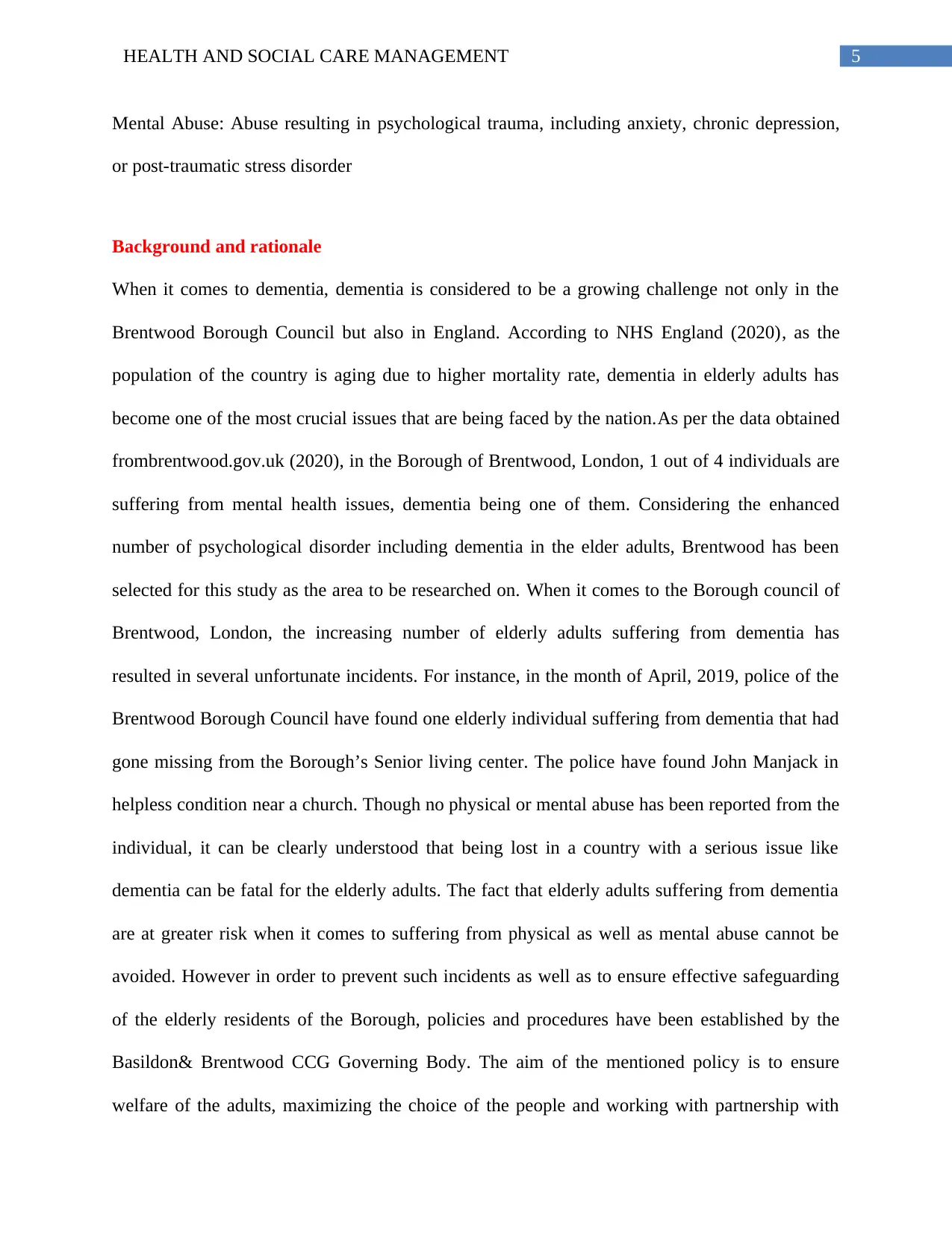
5HEALTH AND SOCIAL CARE MANAGEMENT
Mental Abuse: Abuse resulting in psychological trauma, including anxiety, chronic depression,
or post-traumatic stress disorder
Background and rationale
When it comes to dementia, dementia is considered to be a growing challenge not only in the
Brentwood Borough Council but also in England. According to NHS England (2020), as the
population of the country is aging due to higher mortality rate, dementia in elderly adults has
become one of the most crucial issues that are being faced by the nation.As per the data obtained
frombrentwood.gov.uk (2020), in the Borough of Brentwood, London, 1 out of 4 individuals are
suffering from mental health issues, dementia being one of them. Considering the enhanced
number of psychological disorder including dementia in the elder adults, Brentwood has been
selected for this study as the area to be researched on. When it comes to the Borough council of
Brentwood, London, the increasing number of elderly adults suffering from dementia has
resulted in several unfortunate incidents. For instance, in the month of April, 2019, police of the
Brentwood Borough Council have found one elderly individual suffering from dementia that had
gone missing from the Borough’s Senior living center. The police have found John Manjack in
helpless condition near a church. Though no physical or mental abuse has been reported from the
individual, it can be clearly understood that being lost in a country with a serious issue like
dementia can be fatal for the elderly adults. The fact that elderly adults suffering from dementia
are at greater risk when it comes to suffering from physical as well as mental abuse cannot be
avoided. However in order to prevent such incidents as well as to ensure effective safeguarding
of the elderly residents of the Borough, policies and procedures have been established by the
Basildon& Brentwood CCG Governing Body. The aim of the mentioned policy is to ensure
welfare of the adults, maximizing the choice of the people and working with partnership with
Mental Abuse: Abuse resulting in psychological trauma, including anxiety, chronic depression,
or post-traumatic stress disorder
Background and rationale
When it comes to dementia, dementia is considered to be a growing challenge not only in the
Brentwood Borough Council but also in England. According to NHS England (2020), as the
population of the country is aging due to higher mortality rate, dementia in elderly adults has
become one of the most crucial issues that are being faced by the nation.As per the data obtained
frombrentwood.gov.uk (2020), in the Borough of Brentwood, London, 1 out of 4 individuals are
suffering from mental health issues, dementia being one of them. Considering the enhanced
number of psychological disorder including dementia in the elder adults, Brentwood has been
selected for this study as the area to be researched on. When it comes to the Borough council of
Brentwood, London, the increasing number of elderly adults suffering from dementia has
resulted in several unfortunate incidents. For instance, in the month of April, 2019, police of the
Brentwood Borough Council have found one elderly individual suffering from dementia that had
gone missing from the Borough’s Senior living center. The police have found John Manjack in
helpless condition near a church. Though no physical or mental abuse has been reported from the
individual, it can be clearly understood that being lost in a country with a serious issue like
dementia can be fatal for the elderly adults. The fact that elderly adults suffering from dementia
are at greater risk when it comes to suffering from physical as well as mental abuse cannot be
avoided. However in order to prevent such incidents as well as to ensure effective safeguarding
of the elderly residents of the Borough, policies and procedures have been established by the
Basildon& Brentwood CCG Governing Body. The aim of the mentioned policy is to ensure
welfare of the adults, maximizing the choice of the people and working with partnership with
⊘ This is a preview!⊘
Do you want full access?
Subscribe today to unlock all pages.

Trusted by 1+ million students worldwide
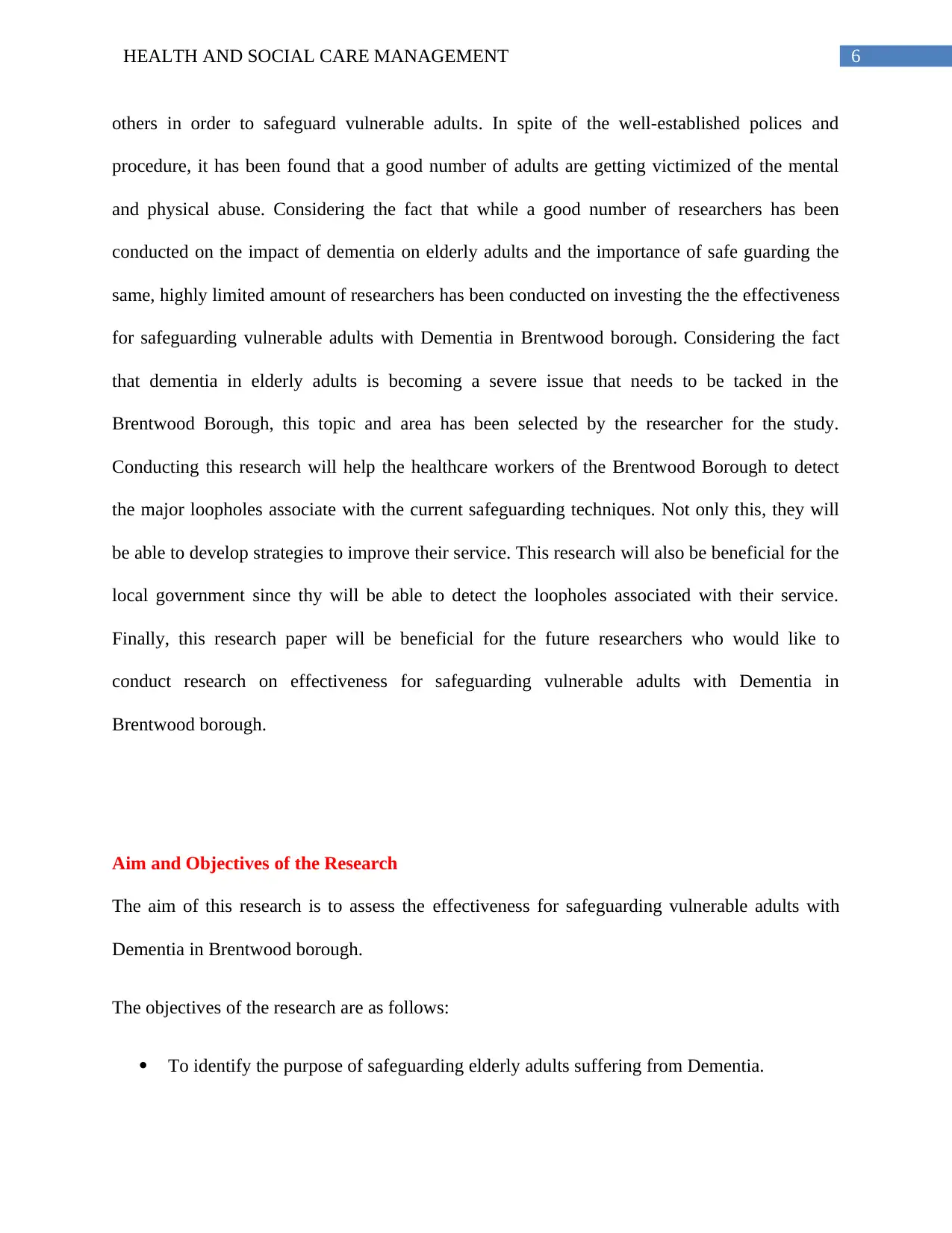
6HEALTH AND SOCIAL CARE MANAGEMENT
others in order to safeguard vulnerable adults. In spite of the well-established polices and
procedure, it has been found that a good number of adults are getting victimized of the mental
and physical abuse. Considering the fact that while a good number of researchers has been
conducted on the impact of dementia on elderly adults and the importance of safe guarding the
same, highly limited amount of researchers has been conducted on investing the the effectiveness
for safeguarding vulnerable adults with Dementia in Brentwood borough. Considering the fact
that dementia in elderly adults is becoming a severe issue that needs to be tacked in the
Brentwood Borough, this topic and area has been selected by the researcher for the study.
Conducting this research will help the healthcare workers of the Brentwood Borough to detect
the major loopholes associate with the current safeguarding techniques. Not only this, they will
be able to develop strategies to improve their service. This research will also be beneficial for the
local government since thy will be able to detect the loopholes associated with their service.
Finally, this research paper will be beneficial for the future researchers who would like to
conduct research on effectiveness for safeguarding vulnerable adults with Dementia in
Brentwood borough.
Aim and Objectives of the Research
The aim of this research is to assess the effectiveness for safeguarding vulnerable adults with
Dementia in Brentwood borough.
The objectives of the research are as follows:
To identify the purpose of safeguarding elderly adults suffering from Dementia.
others in order to safeguard vulnerable adults. In spite of the well-established polices and
procedure, it has been found that a good number of adults are getting victimized of the mental
and physical abuse. Considering the fact that while a good number of researchers has been
conducted on the impact of dementia on elderly adults and the importance of safe guarding the
same, highly limited amount of researchers has been conducted on investing the the effectiveness
for safeguarding vulnerable adults with Dementia in Brentwood borough. Considering the fact
that dementia in elderly adults is becoming a severe issue that needs to be tacked in the
Brentwood Borough, this topic and area has been selected by the researcher for the study.
Conducting this research will help the healthcare workers of the Brentwood Borough to detect
the major loopholes associate with the current safeguarding techniques. Not only this, they will
be able to develop strategies to improve their service. This research will also be beneficial for the
local government since thy will be able to detect the loopholes associated with their service.
Finally, this research paper will be beneficial for the future researchers who would like to
conduct research on effectiveness for safeguarding vulnerable adults with Dementia in
Brentwood borough.
Aim and Objectives of the Research
The aim of this research is to assess the effectiveness for safeguarding vulnerable adults with
Dementia in Brentwood borough.
The objectives of the research are as follows:
To identify the purpose of safeguarding elderly adults suffering from Dementia.
Paraphrase This Document
Need a fresh take? Get an instant paraphrase of this document with our AI Paraphraser
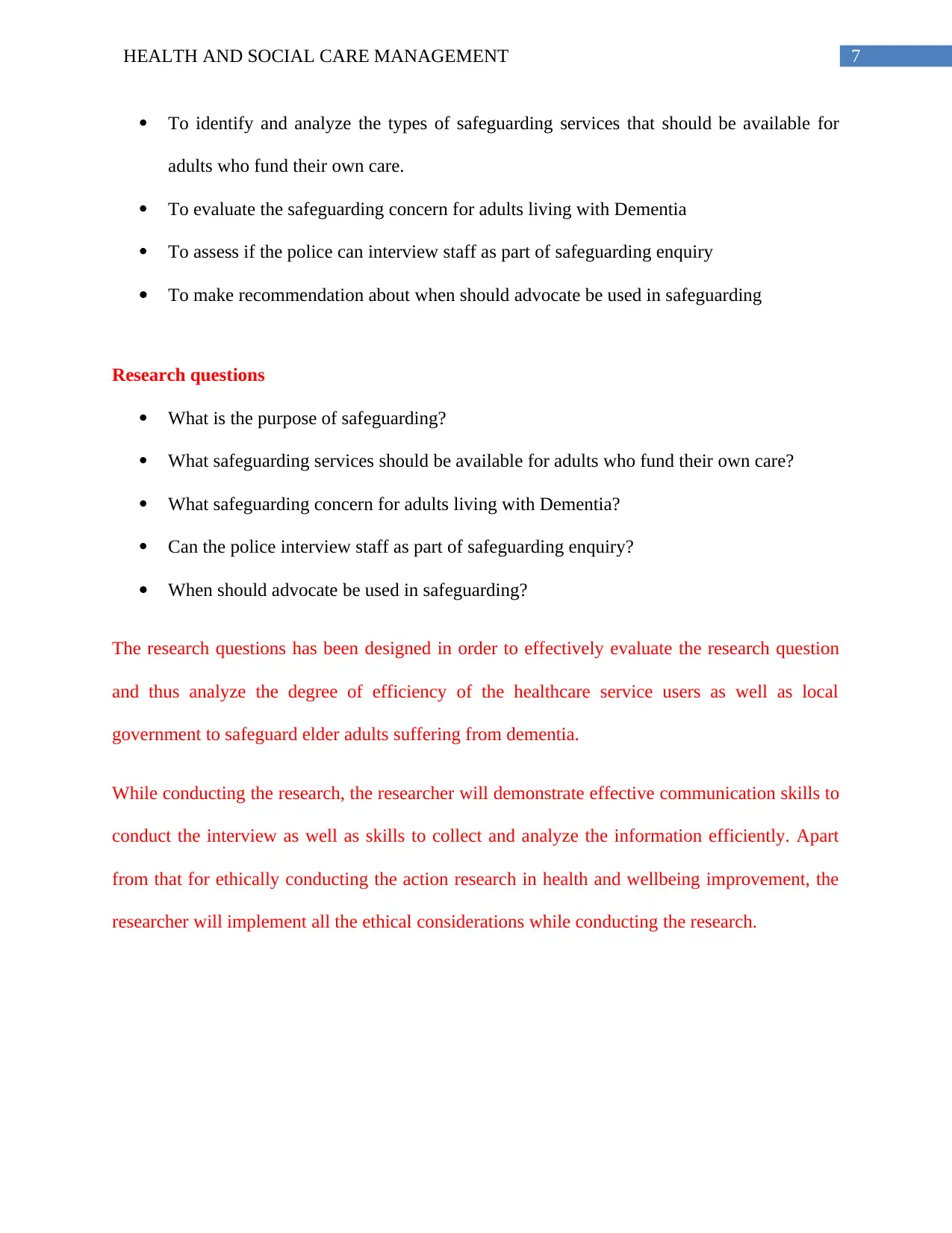
7HEALTH AND SOCIAL CARE MANAGEMENT
To identify and analyze the types of safeguarding services that should be available for
adults who fund their own care.
To evaluate the safeguarding concern for adults living with Dementia
To assess if the police can interview staff as part of safeguarding enquiry
To make recommendation about when should advocate be used in safeguarding
Research questions
What is the purpose of safeguarding?
What safeguarding services should be available for adults who fund their own care?
What safeguarding concern for adults living with Dementia?
Can the police interview staff as part of safeguarding enquiry?
When should advocate be used in safeguarding?
The research questions has been designed in order to effectively evaluate the research question
and thus analyze the degree of efficiency of the healthcare service users as well as local
government to safeguard elder adults suffering from dementia.
While conducting the research, the researcher will demonstrate effective communication skills to
conduct the interview as well as skills to collect and analyze the information efficiently. Apart
from that for ethically conducting the action research in health and wellbeing improvement, the
researcher will implement all the ethical considerations while conducting the research.
To identify and analyze the types of safeguarding services that should be available for
adults who fund their own care.
To evaluate the safeguarding concern for adults living with Dementia
To assess if the police can interview staff as part of safeguarding enquiry
To make recommendation about when should advocate be used in safeguarding
Research questions
What is the purpose of safeguarding?
What safeguarding services should be available for adults who fund their own care?
What safeguarding concern for adults living with Dementia?
Can the police interview staff as part of safeguarding enquiry?
When should advocate be used in safeguarding?
The research questions has been designed in order to effectively evaluate the research question
and thus analyze the degree of efficiency of the healthcare service users as well as local
government to safeguard elder adults suffering from dementia.
While conducting the research, the researcher will demonstrate effective communication skills to
conduct the interview as well as skills to collect and analyze the information efficiently. Apart
from that for ethically conducting the action research in health and wellbeing improvement, the
researcher will implement all the ethical considerations while conducting the research.
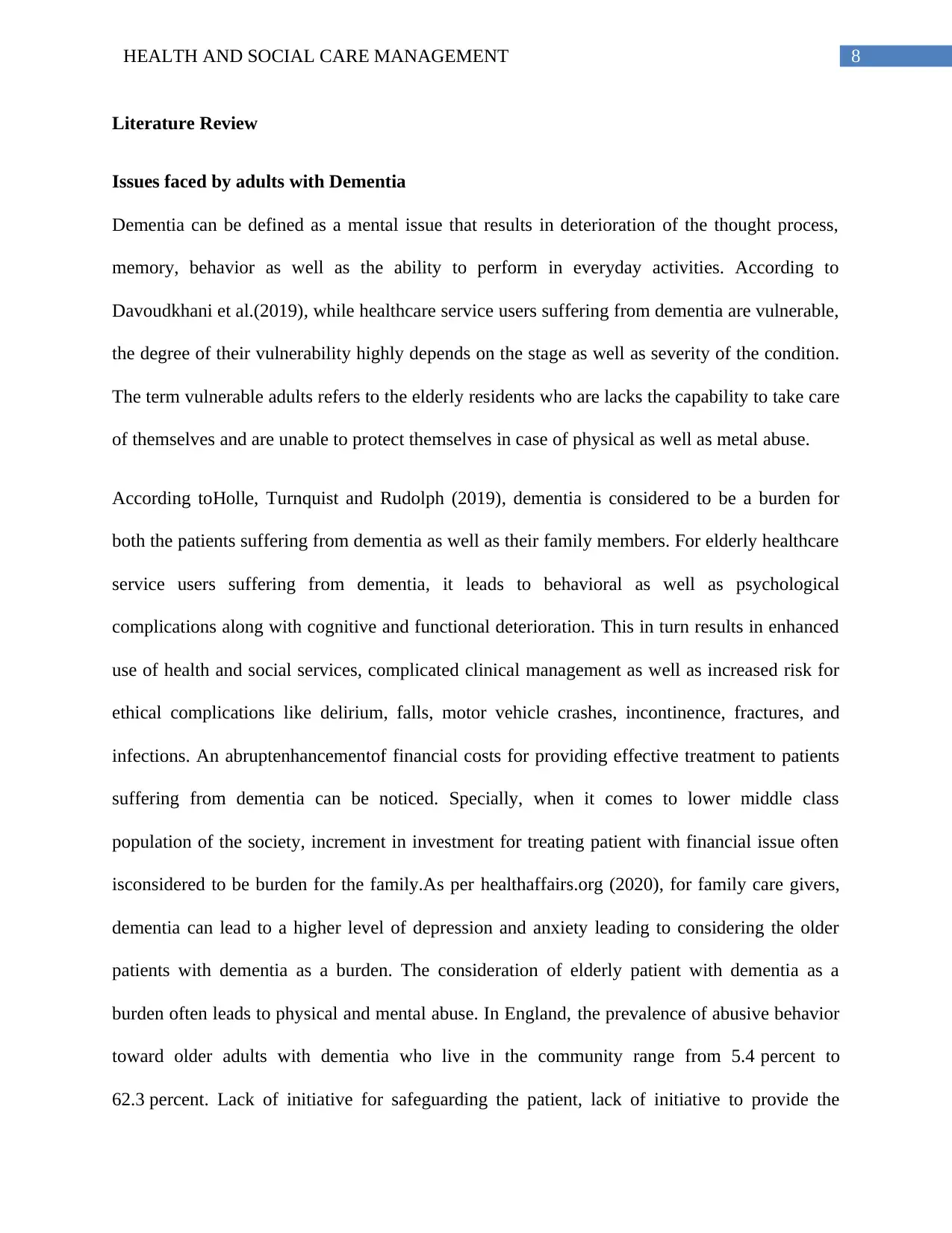
8HEALTH AND SOCIAL CARE MANAGEMENT
Literature Review
Issues faced by adults with Dementia
Dementia can be defined as a mental issue that results in deterioration of the thought process,
memory, behavior as well as the ability to perform in everyday activities. According to
Davoudkhani et al.(2019), while healthcare service users suffering from dementia are vulnerable,
the degree of their vulnerability highly depends on the stage as well as severity of the condition.
The term vulnerable adults refers to the elderly residents who are lacks the capability to take care
of themselves and are unable to protect themselves in case of physical as well as metal abuse.
According toHolle, Turnquist and Rudolph (2019), dementia is considered to be a burden for
both the patients suffering from dementia as well as their family members. For elderly healthcare
service users suffering from dementia, it leads to behavioral as well as psychological
complications along with cognitive and functional deterioration. This in turn results in enhanced
use of health and social services, complicated clinical management as well as increased risk for
ethical complications like delirium, falls, motor vehicle crashes, incontinence, fractures, and
infections. An abruptenhancementof financial costs for providing effective treatment to patients
suffering from dementia can be noticed. Specially, when it comes to lower middle class
population of the society, increment in investment for treating patient with financial issue often
isconsidered to be burden for the family.As per healthaffairs.org (2020), for family care givers,
dementia can lead to a higher level of depression and anxiety leading to considering the older
patients with dementia as a burden. The consideration of elderly patient with dementia as a
burden often leads to physical and mental abuse. In England, the prevalence of abusive behavior
toward older adults with dementia who live in the community range from 5.4 percent to
62.3 percent. Lack of initiative for safeguarding the patient, lack of initiative to provide the
Literature Review
Issues faced by adults with Dementia
Dementia can be defined as a mental issue that results in deterioration of the thought process,
memory, behavior as well as the ability to perform in everyday activities. According to
Davoudkhani et al.(2019), while healthcare service users suffering from dementia are vulnerable,
the degree of their vulnerability highly depends on the stage as well as severity of the condition.
The term vulnerable adults refers to the elderly residents who are lacks the capability to take care
of themselves and are unable to protect themselves in case of physical as well as metal abuse.
According toHolle, Turnquist and Rudolph (2019), dementia is considered to be a burden for
both the patients suffering from dementia as well as their family members. For elderly healthcare
service users suffering from dementia, it leads to behavioral as well as psychological
complications along with cognitive and functional deterioration. This in turn results in enhanced
use of health and social services, complicated clinical management as well as increased risk for
ethical complications like delirium, falls, motor vehicle crashes, incontinence, fractures, and
infections. An abruptenhancementof financial costs for providing effective treatment to patients
suffering from dementia can be noticed. Specially, when it comes to lower middle class
population of the society, increment in investment for treating patient with financial issue often
isconsidered to be burden for the family.As per healthaffairs.org (2020), for family care givers,
dementia can lead to a higher level of depression and anxiety leading to considering the older
patients with dementia as a burden. The consideration of elderly patient with dementia as a
burden often leads to physical and mental abuse. In England, the prevalence of abusive behavior
toward older adults with dementia who live in the community range from 5.4 percent to
62.3 percent. Lack of initiative for safeguarding the patient, lack of initiative to provide the
⊘ This is a preview!⊘
Do you want full access?
Subscribe today to unlock all pages.

Trusted by 1+ million students worldwide
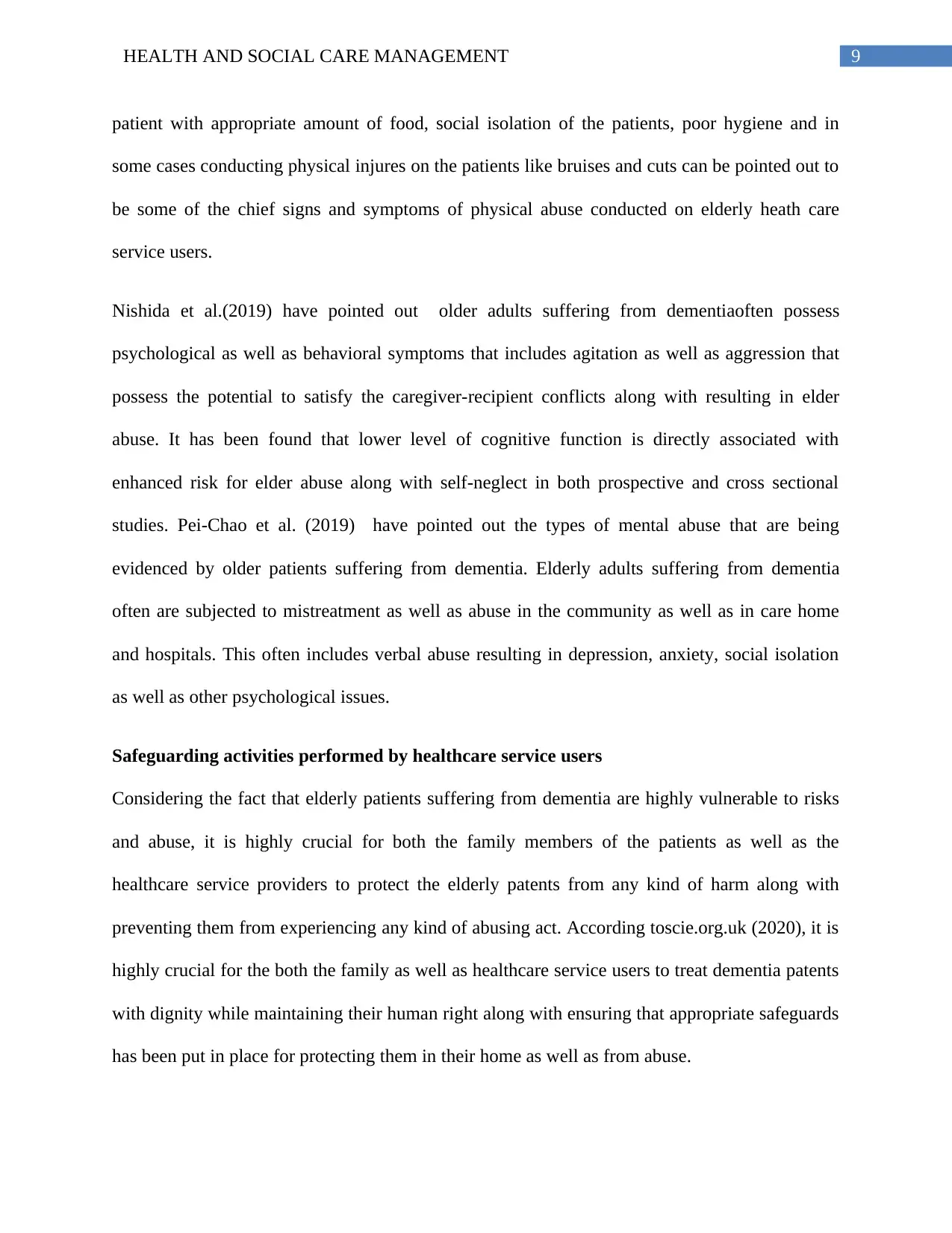
9HEALTH AND SOCIAL CARE MANAGEMENT
patient with appropriate amount of food, social isolation of the patients, poor hygiene and in
some cases conducting physical injures on the patients like bruises and cuts can be pointed out to
be some of the chief signs and symptoms of physical abuse conducted on elderly heath care
service users.
Nishida et al.(2019) have pointed out older adults suffering from dementiaoften possess
psychological as well as behavioral symptoms that includes agitation as well as aggression that
possess the potential to satisfy the caregiver-recipient conflicts along with resulting in elder
abuse. It has been found that lower level of cognitive function is directly associated with
enhanced risk for elder abuse along with self-neglect in both prospective and cross sectional
studies. Pei-Chao et al. (2019) have pointed out the types of mental abuse that are being
evidenced by older patients suffering from dementia. Elderly adults suffering from dementia
often are subjected to mistreatment as well as abuse in the community as well as in care home
and hospitals. This often includes verbal abuse resulting in depression, anxiety, social isolation
as well as other psychological issues.
Safeguarding activities performed by healthcare service users
Considering the fact that elderly patients suffering from dementia are highly vulnerable to risks
and abuse, it is highly crucial for both the family members of the patients as well as the
healthcare service providers to protect the elderly patents from any kind of harm along with
preventing them from experiencing any kind of abusing act. According toscie.org.uk (2020), it is
highly crucial for the both the family as well as healthcare service users to treat dementia patents
with dignity while maintaining their human right along with ensuring that appropriate safeguards
has been put in place for protecting them in their home as well as from abuse.
patient with appropriate amount of food, social isolation of the patients, poor hygiene and in
some cases conducting physical injures on the patients like bruises and cuts can be pointed out to
be some of the chief signs and symptoms of physical abuse conducted on elderly heath care
service users.
Nishida et al.(2019) have pointed out older adults suffering from dementiaoften possess
psychological as well as behavioral symptoms that includes agitation as well as aggression that
possess the potential to satisfy the caregiver-recipient conflicts along with resulting in elder
abuse. It has been found that lower level of cognitive function is directly associated with
enhanced risk for elder abuse along with self-neglect in both prospective and cross sectional
studies. Pei-Chao et al. (2019) have pointed out the types of mental abuse that are being
evidenced by older patients suffering from dementia. Elderly adults suffering from dementia
often are subjected to mistreatment as well as abuse in the community as well as in care home
and hospitals. This often includes verbal abuse resulting in depression, anxiety, social isolation
as well as other psychological issues.
Safeguarding activities performed by healthcare service users
Considering the fact that elderly patients suffering from dementia are highly vulnerable to risks
and abuse, it is highly crucial for both the family members of the patients as well as the
healthcare service providers to protect the elderly patents from any kind of harm along with
preventing them from experiencing any kind of abusing act. According toscie.org.uk (2020), it is
highly crucial for the both the family as well as healthcare service users to treat dementia patents
with dignity while maintaining their human right along with ensuring that appropriate safeguards
has been put in place for protecting them in their home as well as from abuse.
Paraphrase This Document
Need a fresh take? Get an instant paraphrase of this document with our AI Paraphraser
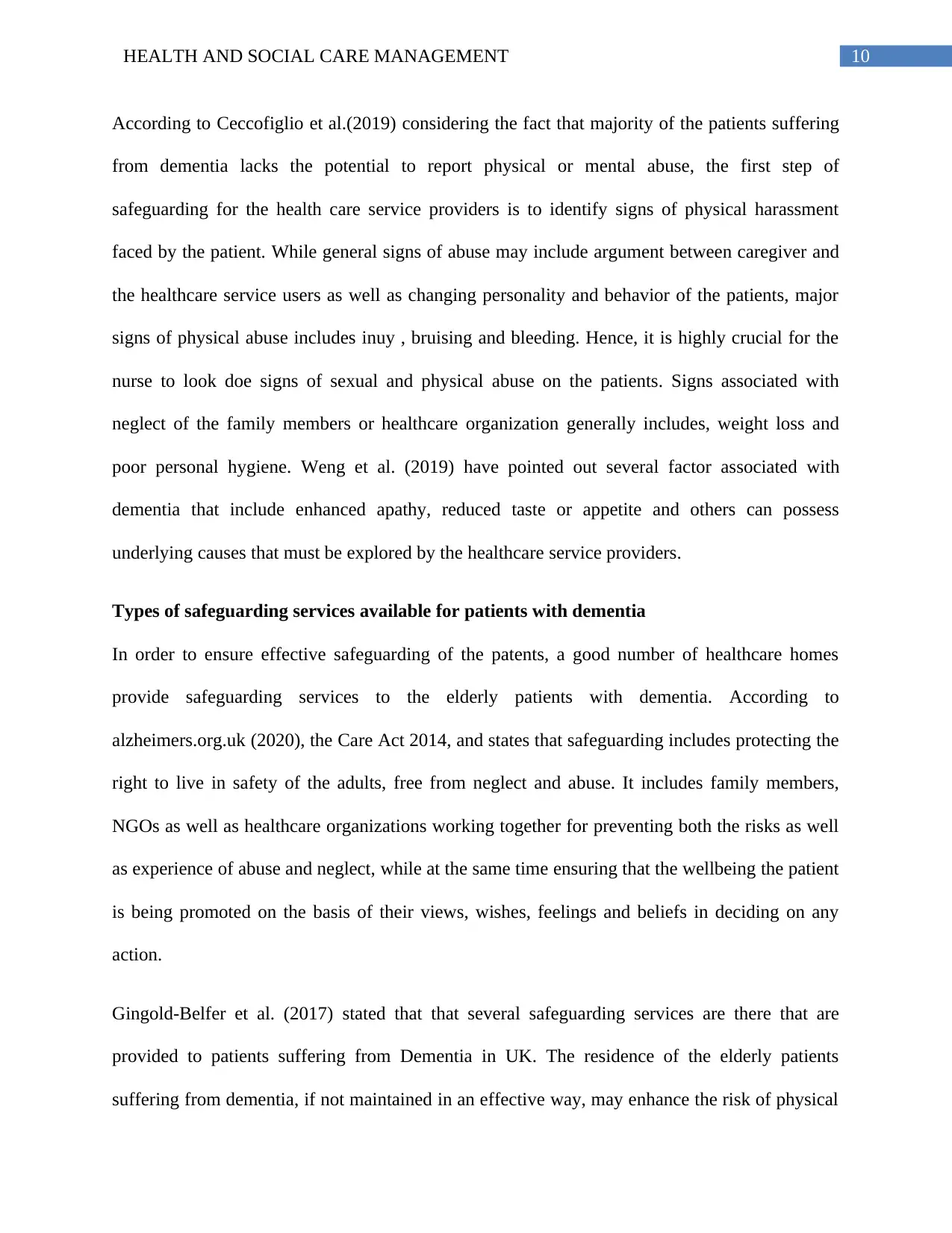
10HEALTH AND SOCIAL CARE MANAGEMENT
According to Ceccofiglio et al.(2019) considering the fact that majority of the patients suffering
from dementia lacks the potential to report physical or mental abuse, the first step of
safeguarding for the health care service providers is to identify signs of physical harassment
faced by the patient. While general signs of abuse may include argument between caregiver and
the healthcare service users as well as changing personality and behavior of the patients, major
signs of physical abuse includes inuy , bruising and bleeding. Hence, it is highly crucial for the
nurse to look doe signs of sexual and physical abuse on the patients. Signs associated with
neglect of the family members or healthcare organization generally includes, weight loss and
poor personal hygiene. Weng et al. (2019) have pointed out several factor associated with
dementia that include enhanced apathy, reduced taste or appetite and others can possess
underlying causes that must be explored by the healthcare service providers.
Types of safeguarding services available for patients with dementia
In order to ensure effective safeguarding of the patents, a good number of healthcare homes
provide safeguarding services to the elderly patients with dementia. According to
alzheimers.org.uk (2020), the Care Act 2014, and states that safeguarding includes protecting the
right to live in safety of the adults, free from neglect and abuse. It includes family members,
NGOs as well as healthcare organizations working together for preventing both the risks as well
as experience of abuse and neglect, while at the same time ensuring that the wellbeing the patient
is being promoted on the basis of their views, wishes, feelings and beliefs in deciding on any
action.
Gingold-Belfer et al. (2017) stated that that several safeguarding services are there that are
provided to patients suffering from Dementia in UK. The residence of the elderly patients
suffering from dementia, if not maintained in an effective way, may enhance the risk of physical
According to Ceccofiglio et al.(2019) considering the fact that majority of the patients suffering
from dementia lacks the potential to report physical or mental abuse, the first step of
safeguarding for the health care service providers is to identify signs of physical harassment
faced by the patient. While general signs of abuse may include argument between caregiver and
the healthcare service users as well as changing personality and behavior of the patients, major
signs of physical abuse includes inuy , bruising and bleeding. Hence, it is highly crucial for the
nurse to look doe signs of sexual and physical abuse on the patients. Signs associated with
neglect of the family members or healthcare organization generally includes, weight loss and
poor personal hygiene. Weng et al. (2019) have pointed out several factor associated with
dementia that include enhanced apathy, reduced taste or appetite and others can possess
underlying causes that must be explored by the healthcare service providers.
Types of safeguarding services available for patients with dementia
In order to ensure effective safeguarding of the patents, a good number of healthcare homes
provide safeguarding services to the elderly patients with dementia. According to
alzheimers.org.uk (2020), the Care Act 2014, and states that safeguarding includes protecting the
right to live in safety of the adults, free from neglect and abuse. It includes family members,
NGOs as well as healthcare organizations working together for preventing both the risks as well
as experience of abuse and neglect, while at the same time ensuring that the wellbeing the patient
is being promoted on the basis of their views, wishes, feelings and beliefs in deciding on any
action.
Gingold-Belfer et al. (2017) stated that that several safeguarding services are there that are
provided to patients suffering from Dementia in UK. The residence of the elderly patients
suffering from dementia, if not maintained in an effective way, may enhance the risk of physical
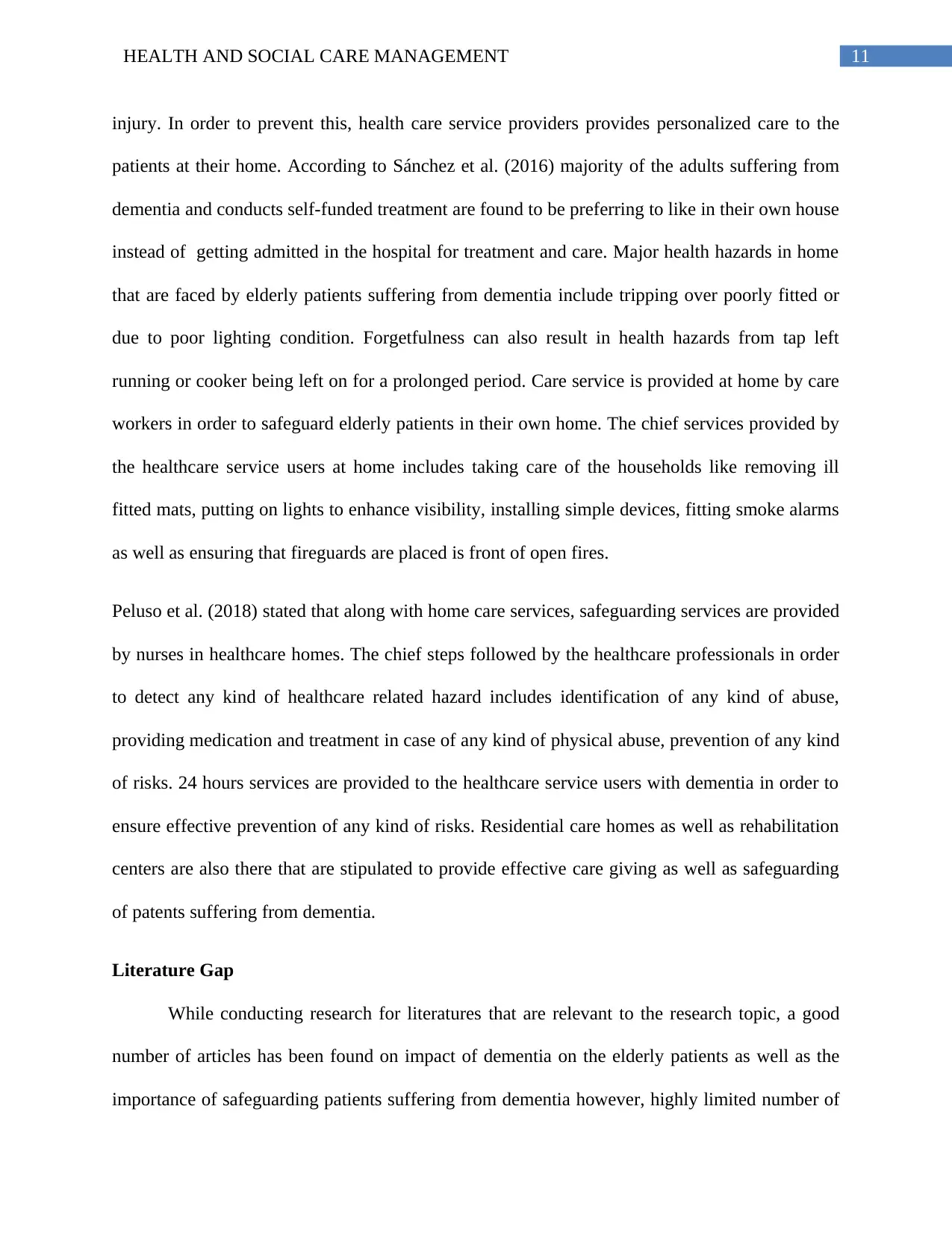
11HEALTH AND SOCIAL CARE MANAGEMENT
injury. In order to prevent this, health care service providers provides personalized care to the
patients at their home. According to Sánchez et al. (2016) majority of the adults suffering from
dementia and conducts self-funded treatment are found to be preferring to like in their own house
instead of getting admitted in the hospital for treatment and care. Major health hazards in home
that are faced by elderly patients suffering from dementia include tripping over poorly fitted or
due to poor lighting condition. Forgetfulness can also result in health hazards from tap left
running or cooker being left on for a prolonged period. Care service is provided at home by care
workers in order to safeguard elderly patients in their own home. The chief services provided by
the healthcare service users at home includes taking care of the households like removing ill
fitted mats, putting on lights to enhance visibility, installing simple devices, fitting smoke alarms
as well as ensuring that fireguards are placed is front of open fires.
Peluso et al. (2018) stated that along with home care services, safeguarding services are provided
by nurses in healthcare homes. The chief steps followed by the healthcare professionals in order
to detect any kind of healthcare related hazard includes identification of any kind of abuse,
providing medication and treatment in case of any kind of physical abuse, prevention of any kind
of risks. 24 hours services are provided to the healthcare service users with dementia in order to
ensure effective prevention of any kind of risks. Residential care homes as well as rehabilitation
centers are also there that are stipulated to provide effective care giving as well as safeguarding
of patents suffering from dementia.
Literature Gap
While conducting research for literatures that are relevant to the research topic, a good
number of articles has been found on impact of dementia on the elderly patients as well as the
importance of safeguarding patients suffering from dementia however, highly limited number of
injury. In order to prevent this, health care service providers provides personalized care to the
patients at their home. According to Sánchez et al. (2016) majority of the adults suffering from
dementia and conducts self-funded treatment are found to be preferring to like in their own house
instead of getting admitted in the hospital for treatment and care. Major health hazards in home
that are faced by elderly patients suffering from dementia include tripping over poorly fitted or
due to poor lighting condition. Forgetfulness can also result in health hazards from tap left
running or cooker being left on for a prolonged period. Care service is provided at home by care
workers in order to safeguard elderly patients in their own home. The chief services provided by
the healthcare service users at home includes taking care of the households like removing ill
fitted mats, putting on lights to enhance visibility, installing simple devices, fitting smoke alarms
as well as ensuring that fireguards are placed is front of open fires.
Peluso et al. (2018) stated that along with home care services, safeguarding services are provided
by nurses in healthcare homes. The chief steps followed by the healthcare professionals in order
to detect any kind of healthcare related hazard includes identification of any kind of abuse,
providing medication and treatment in case of any kind of physical abuse, prevention of any kind
of risks. 24 hours services are provided to the healthcare service users with dementia in order to
ensure effective prevention of any kind of risks. Residential care homes as well as rehabilitation
centers are also there that are stipulated to provide effective care giving as well as safeguarding
of patents suffering from dementia.
Literature Gap
While conducting research for literatures that are relevant to the research topic, a good
number of articles has been found on impact of dementia on the elderly patients as well as the
importance of safeguarding patients suffering from dementia however, highly limited number of
⊘ This is a preview!⊘
Do you want full access?
Subscribe today to unlock all pages.

Trusted by 1+ million students worldwide
1 out of 28
Related Documents
Your All-in-One AI-Powered Toolkit for Academic Success.
+13062052269
info@desklib.com
Available 24*7 on WhatsApp / Email
![[object Object]](/_next/static/media/star-bottom.7253800d.svg)
Unlock your academic potential
Copyright © 2020–2026 A2Z Services. All Rights Reserved. Developed and managed by ZUCOL.





